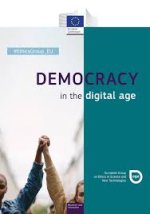In recent years, the concept of "digital democracy" has gained momentum as technology continues to reshape how people engage with politics. Digital democracy refers to the use of digital tools and platforms to enhance democratic processes, including voting, policy-making, and civic engagement. While it offers promising solutions to increase political participation and transparency, it also presents new risks and challenges that require thoughtful consideration.
One of the most striking benefits of digital democracy is accessibility. In traditional systems, political participation is often limited by geography, time constraints, and institutional barriers. However, with the help of smartphones, social media, and online platforms, people can now join discussions, attend virtual town halls, and sign petitions from anywhere in the world. This has particularly empowered younger generations and marginalized groups, giving them a stronger voice in political debates.
Digital tools have also improved transparency in governance. Live-streamed parliamentary sessions, open-data initiatives, and online budget trackers allow citizens to monitor how decisions are made and how public funds are spent. This kind of digital accountability can strengthen trust in government and reduce corruption, especially in countries where traditional oversight mechanisms are weak or ineffective.
Another promising development is the use of online voting, or e-voting. Estonia, a small European country, has pioneered this technology and allows its citizens to vote securely over the internet. This convenience has led to higher voter turnout and increased civic engagement. If implemented securely and widely, online voting could be a game-changer in global elections, especially in times of crisis like pandemics or natural disasters.
However, digital democracy is not without its challenges. Cybersecurity is a major concern. Political hacking, data breaches, and foreign interference have raised fears about the integrity of online political activities. Protecting digital systems from manipulation requires constant innovation, robust cybersecurity infrastructure, and international cooperation.
Furthermore, the digital divide poses a serious risk to the fairness of digital democracy. Not everyone has equal access to technology or the internet. Rural populations, the elderly, and low-income communities often lack the resources to fully participate in digital platforms. This creates new forms of inequality that must be addressed to ensure inclusive governance.
Misinformation and disinformation also threaten the democratic process online. Fake news spreads rapidly through social media, influencing public opinion and polarizing societies. Algorithm-driven content can create echo chambers where users are only exposed to views they already agree with, undermining critical thinking and productive dialogue.
Despite these challenges, the potential of digital democracy is undeniable. Governments and citizens must work together to design inclusive, secure, and transparent digital tools that can complement traditional democratic institutions. By embracing innovation while safeguarding democratic values, we can create a future where every voice truly counts—online and offline.
One of the most striking benefits of digital democracy is accessibility. In traditional systems, political participation is often limited by geography, time constraints, and institutional barriers. However, with the help of smartphones, social media, and online platforms, people can now join discussions, attend virtual town halls, and sign petitions from anywhere in the world. This has particularly empowered younger generations and marginalized groups, giving them a stronger voice in political debates.
Digital tools have also improved transparency in governance. Live-streamed parliamentary sessions, open-data initiatives, and online budget trackers allow citizens to monitor how decisions are made and how public funds are spent. This kind of digital accountability can strengthen trust in government and reduce corruption, especially in countries where traditional oversight mechanisms are weak or ineffective.
Another promising development is the use of online voting, or e-voting. Estonia, a small European country, has pioneered this technology and allows its citizens to vote securely over the internet. This convenience has led to higher voter turnout and increased civic engagement. If implemented securely and widely, online voting could be a game-changer in global elections, especially in times of crisis like pandemics or natural disasters.
However, digital democracy is not without its challenges. Cybersecurity is a major concern. Political hacking, data breaches, and foreign interference have raised fears about the integrity of online political activities. Protecting digital systems from manipulation requires constant innovation, robust cybersecurity infrastructure, and international cooperation.
Furthermore, the digital divide poses a serious risk to the fairness of digital democracy. Not everyone has equal access to technology or the internet. Rural populations, the elderly, and low-income communities often lack the resources to fully participate in digital platforms. This creates new forms of inequality that must be addressed to ensure inclusive governance.
Misinformation and disinformation also threaten the democratic process online. Fake news spreads rapidly through social media, influencing public opinion and polarizing societies. Algorithm-driven content can create echo chambers where users are only exposed to views they already agree with, undermining critical thinking and productive dialogue.
Despite these challenges, the potential of digital democracy is undeniable. Governments and citizens must work together to design inclusive, secure, and transparent digital tools that can complement traditional democratic institutions. By embracing innovation while safeguarding democratic values, we can create a future where every voice truly counts—online and offline.

